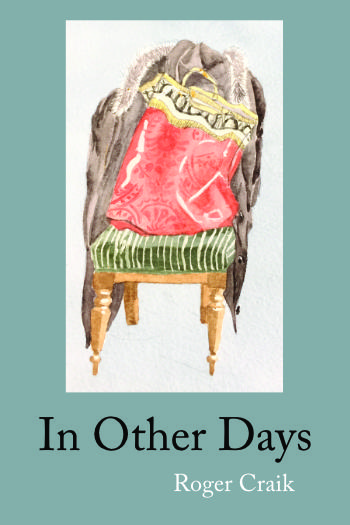
An excellent online interview between Roger Craik, and Deborah Kalb. They discuss his latest book of poetry, In Other Days. Here is a brief excerpt:
Q: Over how long a period did you write the poems in In Other Days?
A: Some of the poems came from the mid 2000s, as far as I recall, but the majority were written since 2014, when my book Down Stranger Roads came out. There might even have been some that were worked up from efforts in the late 1990s.
Q: The poet Donald Revell says of the collection, “Craik adventures far beyond pathos and nostalgia, into something like a prospect of eternity.” What do you think of that description?
A: It’s always interesting, don’t you think, to hear what people think about your stuff. I am not sure exactly what Donald Revell means by “something like a prospect of eternity,” although it’s pleasing to read that the poems reach to this extent, and present such a long perspective.
I so like his word “adventures”— what a fine verb this is. It suggests to me a boldness and also, somehow, an enjoyment.
In the collection are many subjects, and viewpoints, in the minds of real or imaginary others.
There is a piece, “Exile,” about a Russian painter from a tiny village, who spends four years in Paris as an art student, and at the end of that time has to return to Russia for an arranged marriage, unwillingly, and perhaps (the poem leaves this uncertain) jumps off a stationary train in the middle of nowhere.
I suppose some of this came from reading about Marc Chagall, but that is all, and everything else came out of my head. I am not given to jumping off stationary trains.
There is a poem about a scientist in Cambridge, England, who makes a tremendous discovery (the poem doesn’t say what it is), tries it out time after time in his office (“it works every time”), then puts on his coat and hat and strolls home, with the discovery in his head, the early evening streets being as they always are at that time of day.
Another poem is in the voice of the widow of Cain, mentioned very briefly in the Old Testament, whom I portray as slightly turned in her mind (with syntax to match).
I (unallowably perhaps) imagined what it would be like for a Holocaust survivor to be interviewed in rich, apparently secure, New York, and misspeak, or there be some technical glitch, and he has to say it all again, realizing how like an actor he sounds, and not himself, and, far worse, somehow betraying what he remembers.
I wonder if these are things such as Donald Revell means by “adventuring”?
There is a poem in which the speaker’s mother is dying, and he starts fantasizing about being in Amsterdam and drinking fine Dutch coffee there, Douwe and Egberts, and the lines came to me as smearing themselves all over the page when he starts thinking of his plane in the clouds, Amsterdam-bound. It just came out that way.
The poems are of different lengths, Deborah. One has only seven lines, and is about how depressing, and daunting, it can be to read an anthology of very good poetry, and how immeasurably better it is than one’s own.
One is a paragraph of prose, an early childhood scene in Leicestershire, by the Grand Union Canal.
At any rate, I think it is good that people, in whatever form of making they are involved, take risks, as long as those risks do not produce something gimmicky and contrived-sounding.
Read the whole interview here
Buy or read an excerpt from Roger Craik’s, In Other Days here
![BlazeVOX [books]](https://wp.blazevox.org/wp-content/uploads/2015/03/convoy-logo-7.png)